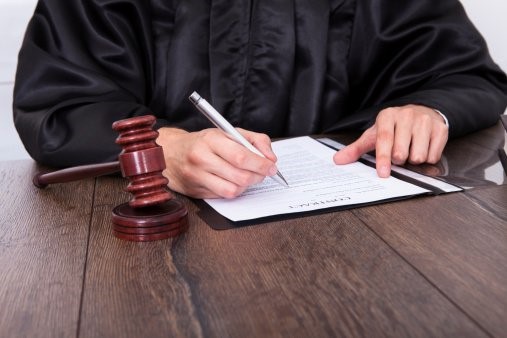
After Going to Court
This page has information about your options after a judge has ruled on your case. It does not discuss what to do after a trial in front of a jury. You should strongly consider talking to an attorney about your options if your case involved a jury.
- Proposed order. At or before the hearing, give the judge a “proposed order.” A proposed order is a document describing the things you want the judge to order. Make sure you give a copy of the proposed order to the lawyer or person on the other side of the case. At the end of the hearing, the judge will do one of three things:
- Judge signs. The judge may sign your proposed order or sign a proposed order that the other side has given the judge. The judge also might change or add something on the order before signing it.
- Judge takes case under advisement. The judge might say that he or she is taking the case under advisement. That means the judge will take more time to make a decision about the case.
- Judge asks a party to put an order into writing. The judge may tell you and the person on the other side what he or she is ordering, and ask you or the other person to put it into writing.
- Decree/judgment. A document signed by the judge that describes the judge’s decision is called a “Decree” or a “Judgment.” File the Decree or Judgment with the original signature of the judge in the clerk’s office where you filed your Petition or Answer. Generally, the Decree or Judgment becomes final when the time has passed for a higher court to be able to review it.
- Appeal. The request that a Judgment be reviewed by a higher court is called an “appeal.” The time for filing an appeal depends on the kind of case. For example, generally the time for filing an appeal of a divorce case is 30 days after the Judgment or Decree is signed.
- Talk to a lawyer about when to file. It can be complicated figuring out the amount of time you have to file an appeal, and the time frames for filing an appeal are strict, so it would be a good idea to talk to a lawyer about the time for filing an appeal in your case. Generally, once the time for filing an appeal has passed, the Judgment in your case will become final.
- Talk to a lawyer about the basis for an appeal. If you are thinking about filing an appeal, you should talk to a lawyer about whether there is a legal basis for filing an appeal. Just because you do not agree with the judge’s decision does not mean that you have a legal basis for an appeal.
- Certified copy of Judgment. Once the Judgment in your case has been filed in the clerk’s office, get a certified copy of the Judgment at the clerk’s office where you filed the Petition or filed your Answer. A certified copy is one that has been stamped by an employee of the clerk’s office, and it is proof of the Judgment or Decree. There will be a small charge to get a certified copy.
- Abstracting a Judgment. If you have a final Judgment that says someone must pay you money, you should file a certified copy of the Judgment in the property records of the county where the case was and in any other county where property is owned by the person or company that has been ordered to pay you money. This is called “abstracting” the Judgment. The Abstract of Judgment is filed in the county clerk’s office, the same place where property deeds are filed. There is usually a form to be filled out that describes what the Judgment says. There is also a small fee required to abstract the Judgment.
NOTE: Specific information about collecting the money owed to you under a court’s order is beyond the scope of this guide. However, there are lawyers who help people collect money owed to them under court judgments. These lawyers may charge a contingent fee, which means that the lawyer will take a percentage of the money collected as a fee. To find a lawyer to help you collect a judgment, call the State Bar Lawyer Referral Service at 1-800-252-9690.